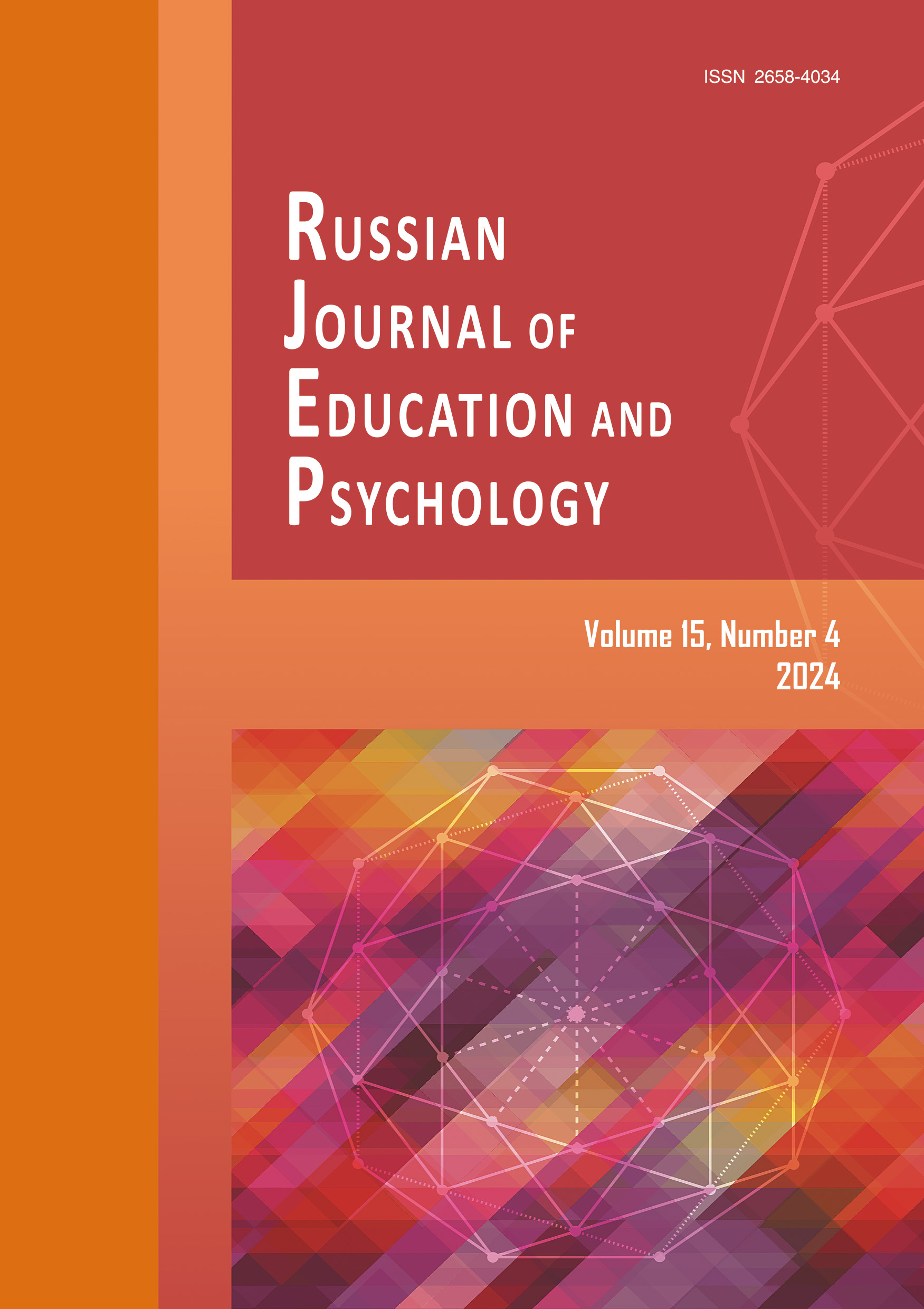СРАВНИТЕЛЬНОЕ ИССЛЕДОВАНИЕ УРОВНЯ КУЛЬТУРНОГО ИНТЕЛЛЕКТА СОТРУДНИКОВ С ОГРАНИЧЕННЫМИ ВОЗМОЖНОСТЯМИ В РОССИИ И КИТАЕ
Аннотация
Обоснование. По мере того, как инклюзивное образование и социальное равенство продолжают развиваться, все больше и больше людей с ограниченными возможностями с профессиональной подготовкой ищут возможности для интеграции на рабочем месте. Однако в нынешней рабочей среде они сталкиваются с различными проблемами. С точки зрения культурной модели, сотрудники с ограниченными возможностями отличаются от своих трудоспособных коллег когнитивными способностями или моделями поведения. В результате появилась новая концепция, такая как культурная компетентность людей с ограниченными возможностями. Для того чтобы адаптироваться и хорошо функционировать в инклюзивных рабочих коллективах, культурный интеллект сотрудников с ограниченными возможностями стал жизненно важным, но его еще предстоит глубоко изучить в России.
Цель. В статье предпринята попытка выявить уровень культурного интеллекта российских сотрудников с ограниченными возможностями и сравнить культурный интеллект сотрудников с ограниченными возможностями из России и Китая.
Материалы и методы. Культурный интеллект был измерен с помощью адаптированной для России и Китая шкалы культурного интеллекта среди 25 российских и 23 китайских сотрудников с ограниченными возможностями. Затем мы использовали SPSS 26.0 для проведения описательного анализа, тест на нормальность и анализ сравнения средних значений.
Результаты. Уровень культурного интеллекта как российских, так и китайских сотрудников находится на среднем уровне. Российские сотрудники с ограниченными возможностями имеют более высокий уровень культурного интеллекта, чем китайские сотрудники с ограниченными возможностями. Кроме того, это исследование подчеркнуло, что не существует существенной разницы в культурном интеллекте в зависимости от этнической принадлежности, пола или типа инвалидности, в то время как существует значительная разница в культурном интеллекте в зависимости от возраста участников.
Скачивания
Литература
References
Belovol E. V., Shkvarilo K. A., Khvorova E. M. Adaptatsiya oprosnika «Shkala kul'turnogo intellekta» K. Erli i S. Anga na russkoyazychnoy vyborke [Russian-Language Verification of PC Earley and S. Ang’s “Cultural Intelligence Scale”]. Vestnik Rossiyskogo universiteta druzhby narodov. Seriya: Psikhologiya i pedagogika [RUDN Journal of Psychology and Pedagogics], 2012, no. 4, pp. 5-14.
Karabuschenko N. B., Pilishvili T. S., Chkhikvadze T. V., Sungurova N. L. Osobennosti sotsial'nogo, emotsional'nogo i kul'turnogo intellekta i raspoznavaniya emotsiy u predstaviteley Rossii i stran Azii [Features of social, emotional and cultural intelligence and recognition of emotions by Russian and Asian students]. Vestnik Rossiyskogo universiteta druzhby narodov. Seriya: Sotsiologiya [RUDN Journal of Sociology], 2020, vol. 20, no. 2, pp. 394-404. https://doi.org/10.22363/2313-2272-2020-20-2-394-404
Ang S., Van Dyne L., Koh C. Personality correlates of the four-factor model of cultural intelligence. Group & organization management, 2006, vol. 31, no. 1, pp.100-123. https://doi.org/10.1177/1059601105275267
Ang S., Van Dyne L., Koh C., Ng K. Y., Templer K. J., Tay C., Chandrasekar N. A. Cultural intelligence: Its measurement and effects on cultural judgment and decision making, cultural adaptation and task performance. Management and organization review, 2007, vol. 3, no. 3, pp. 335-371. https://doi.org/10.1111/j.1740-8784.2007.00082.x
Ang S., Van Dyne L. Handbook of cultural intelligence: Theory, measurement, and applications. New York: Routledge, 2015, 414 p.
Baranova T., Kobicheva A., Tokareva E. The impact of an online intercultural project on students’ cultural intelligence development. In International Conference on Professional Culture of the Specialist of the Future. Cham: Springer International Publishing, 2020, pp. 219-229. https://doi.org/10.1007/978-3-030-65857-1_19
Boštjančič E., Ismagilova F. S., Milijašević S. P. The Role of Managers’ Cultural Intelligence and Demographic Variables in Building Trust in Business Relations. Changing Societies & Personalities, 2022, vol. 6, no. 4, pp. 927-944. https://doi.org/10.15826/csp.2022.6.4.210
Bücker J., Furrer O., Peeters W. T. Measuring cultural intelligence across cultures: Testing cross-cultural equivalence of the CQ scale. Academy of Management Proceedings, 2012, no. 1, pp. 14401. https://doi.org/10.5465/AMBPP.2012.14401abstract
Cartwright S., Pappas, C. Emotional intelligence, its measurement and implications for the workplace. International Journal of Management Reviews, 2008, vol.10, no. 2, pp. 149-171. https://doi.org/10.1111/j.1468-2370.2007.00220.x
Chkhikvadze T., Pilishvili T., Karabuschenko N., Magomedova E. Cultural and Emotional Intelligence among Asian Students in Russia. NORDSCI International Conference, 2019. https://doi.org/10.32008/NORDSCI2019/B1/V2/03
Earley P. C., Ang S. Cultural intelligence: Individual interactions across cultures. Stanford: Stanford University Press, 2003, 379 p.
Earley P. C., Mosakowski, E. Cultural intelligence. Harvard business review, 2004, vol. 82, no. 10, pp. 139-146.
Engle R. L., Nehrt C. C. Antecedents of cultural intelligence: The role of risk, control, and openness in France and the United States. Journal of Management Policy and Practice, 2012, vol.13, no.5, pp. 35-47.
Fischer N. Cultural Intelligence-A key competence in intercultural sales? A study across three cultural contexts (France, India & England). PhD dissertation. Montpellier, Université de Montpellier, 2022, 489 p.
Gardner H. Frames of mind: The theory of multiple intelligences. New York: Basic Books, 1983, 529 p.
Garland-Thomson R., Iezzoni L. I. Disability cultural competence for all as a model. The American Journal of Bioethics, 2021, vol. 21, no. 9, pp. 26-28. https://doi.org/10.1080/15265161.2021.1958652
Huff K. C., Song P., Gresch E. B. Cultural intelligence, personality, and cross-cultural adjustment: A study of expatriates in Japan. International Journal of Intercultural Relations, 2014, vol.38, pp. 151-157. https://doi.org/10.1016/j.ijintrel.2013.08.005
Kiznyte J., Ciutiene R., Dechange A. Applying cultural intelligence in international project management. PM World Journal, 2015, vol. 4, no. 6, pp. 1-16.
Lin Y. C., Chen A. S. Y., Song Y. C. Does your intelligence help to survive in a foreign jungle? The effects of cultural intelligence and emotional intelligence on cross-cultural adjustment. International Journal of intercultural relations, 2012, vol. 36, no. 4, pp. 541-552. https://doi.org/10.1016/j.ijintrel.2012.03.001
Livermore D., Van Dyne L., Ang S. Cultural intelligence: Why every leader needs it. Intercultural Management Quarterly, 2012, vol. 13, no. 2, pp. 18-21.
Matsumoto D., Hwang H. C. Assessing cross-cultural competence: A review of available tests. Journal of cross-cultural psychology, 2013, vol. 44, no. 6, pp. 849-873. https://doi.org/10.1177/0022022113492891
Mayer J. D., Geher G. Emotional intelligence and the identification of emotion. Intelligence, 1996, vol. 22, no. 2, pp. 89-113. https://doi.org/10.1016/S0160-2896(96)90011-2
Puar J. K. The right to maim: Debility, capacity, disability. Durham: Duke University Press, 2017, 296 p.
Remhof S., Gunkel M., Schlägel C. Working in the “global village”: The influence of cultural intelligence on the intention to work abroad. German Journal of Human Resource Management, 2013, vol. 27, no. 3, pp. 224-250. https://doi.org/10.1177/239700221302700304
Şahin F., Gurbuz S., Köksal O. Cultural intelligence (CQ) in action: The effects of personality and international assignment on the development of CQ. International Journal of Intercultural Relations, 2014, vol. 39, pp. 152-163. https://doi.org/10.1016/j.ijintrel.2013.11.002
Salovey P., Mayer J.D. Emotional intelligence. Imagination, Cognition, and Personality, 1990, vol. 9, pp. 185-211. https://doi.org/10.2190/DUGG-P24E-52WK-6CDG
Schlägel C., Sarstedt M. Assessing the measurement invariance of the four-dimensional cultural intelligence scale across countries: A composite model approach. European Management Journal, 2016, vol. 34, no. 6, pp. 633-649. https://doi.org/10.1016/j.emj.2016.06.002
Şenel M. Investigation of the Cultural Intelligence Levels of the Turkish University Students at Foreign Language Departments. International Journal of Language Education, 2020, vol. 4, no. 3, pp. 361-377.
Smith L., Ciarrochi J., Heaven P. C. The stability and change of trait emotional intelligence, conflict communication patterns, and relationship satisfaction: A one-year longitudinal study. Personality and Individual Differences, 2008, vol. 45, no. 8, pp. 738-743. https://doi.org/10.1016/j.paid.2008.07.023
Sternberg R. J. Intelligence, wisdom, and creativity: Three is better than one. Educational Psychologist, 1986, vol. 21, no. 3, pp. 175-190. https://doi.org/10.1207/s15326985ep2103_2
Tang N.Y., Zheng X.S., Zhang J.S., Fu J. Research on the construct and criterion-related validity of cultural intelligence. Psychological Science, 2010, vol. 2, p. 5.
Thorndike R. L., Stein S. An evaluation of the attempts to measure social intelligence. Psychological bulletin, 1937, vol. 34, no. 5, p. 275. https://doi.org/10.1037/h0053850
Van Dyne L., Ang S., Ng K. Y., Rockstuhl T., Tan M. L., Koh C. Sub‐dimensions of the four factor model of cultural intelligence: Expanding the conceptualization and measurement of cultural intelligence. Social and personality psychology compass, 2012, vol. 6, no. 4, pp. 295-313. https://doi.org/10.1111/j.1751-9004.2012.00429.x
Wang Q. Q., Tang N. Y., Meng H. Construct validity of Cultural Intelligence Questionnaire in Chinese college students. Chinese Mental Health Journal, 2008, vol. 22, no. 9, pp. 654-657.
Wong C. S., Law K. S. Wong and law emotional intelligence scale. The leadership quarterly, 2002. https://doi.org/10.1037/t07398-000
Yang Y., Bérubé M. Disability Studies, Literature, and Humanities: An Interview with Michael Bérubé. Foreign Literature Studies, 2022, vol. 44, no. 2, pp. 1-16.
Список литературы
Беловол Е.В., Шкварило К.А., Хворова Е.М. Адаптация опросника «Шкала культурного интеллекта» К. Эрли и С. Анга на русскоязычной выборке // Вестник Российского университета дружбы народов. Серия: Психология и педагогика. 2012. № 4. C. 5-14.
Карабущенко Н.Б., Пилишвили Т.С., Чхиквадзе Т.В., Сунгурова Н.Л. Особенности социального, эмоционального и культурного интеллекта и распознавания эмоций у представителей России и стран Азии // Вестник Российского университета дружбы народов. Серия: Социология. 2020. Т. 20, № 2. C. 394-404. https://doi.org/10.22363/2313-2272-2020-20-2-394-404
Ang S., Van Dyne L., Koh C. Personality correlates of the four-factor model of cultural intelligence // Group & organization management. 2006. Vol. 31, No. 1. P.100-123. https://doi.org/10.1177/1059601105275267
Ang S., Van Dyne L., Koh C., Ng K. Y., Templer K. J., Tay C., Chandrasekar N. A. Cultural intelligence: Its measurement and effects on cultural judgment and decision making, cultural adaptation and task performance // Management and organization review. 2007. Vol. 3, No. 3. P. 335-371. https://doi.org/10.1111/j.1740-8784.2007.00082.x
Ang S., Van Dyne L. Handbook of cultural intelligence: Theory, measurement, and applications. New York: Routledge, 2015, 414 p.
Baranova T., Kobicheva A., Tokareva E. The impact of an online intercultural project on students’ cultural intelligence development // In International Conference on Professional Culture of the Specialist of the Future. Cham: Springer International Publishing, 2020, pp. 219-229. https://doi.org/10.1007/978-3-030-65857-1_19
Boštjančič E., Ismagilova F. S., Milijašević S. P. The Role of Managers’ Cultural Intelligence and Demographic Variables in Building Trust in Business Relations // Changing Societies & Personalities. 2022. Vol. 6, No. 4. P. 927-944. https://doi.org/10.15826/csp.2022.6.4.210
Bücker J., Furrer O., Peeters W. T. Measuring cultural intelligence across cultures: Testing cross-cultural equivalence of the CQ scale // Academy of Management Proceedings. 2012. No. 1. P. 14401. https://doi.org/10.5465/AMBPP.2012.14401abstract
Cartwright S., Pappas C. Emotional intelligence, its measurement and implications for the workplace // International Journal of Management Reviews. 2008. Vol. 10, No. 2. P. 149-171. https://doi.org/10.1111/j.1468-2370.2007.00220.x
Chkhikvadze T., Pilishvili T., Karabuschenko N., Magomedova E. Cultural and Emotional Intelligence among Asian Students in Russia // NORDSCI International Conference. 2019. https://doi.org/10.32008/NORDSCI2019/B1/V2/03
Earley P. C., Ang S. Cultural intelligence: Individual interactions across cultures. Stanford: Stanford University Press, 2003, 379 p.
Earley P. C., Mosakowski E. Cultural intelligence // Harvard business review. 2004. Vol. 82, No. 10. P. 139-146.
Engle R. L., Nehrt C. C. Antecedents of cultural intelligence: The role of risk, control, and openness in France and the United States // Journal of Management Policy and Practice. 2012. Vol. 13, No. 5. P. 35-47.
Fischer N. Cultural Intelligence-A key competence in intercultural sales? A study across three cultural contexts (France, India & England). Doctoral dissertation. Montpellier, Université de Montpellier, 2022, 489 p.
Gardner H. Frames of mind: The theory of multiple intelligences. New York: Basic Books, 1983, 529 p.
Garland-Thomson R., Iezzoni L. I. Disability cultural competence for all as a model // The American Journal of Bioethics. 2021. Vol. 21, No. 9. P. 26-28. https://doi.org/10.1080/15265161.2021.1958652
Huff K. C., Song P., Gresch E. B. Cultural intelligence, personality, and cross-cultural adjustment: A study of expatriates in Japan // International Journal of Intercultural Relations. 2014. Vol. 38. P. 151-157. https://doi.org/10.1016/j.ijintrel.2013.08.005
Kiznyte J., Ciutiene R., Dechange A. Applying cultural intelligence in international project management // PM World Journal. 2015. Vol. 4, No. 6. P. 1-16.
Lin Y. C., Chen A. S. Y., Song Y. C. Does your intelligence help to survive in a foreign jungle? The effects of cultural intelligence and emotional intelligence on cross-cultural adjustment // International Journal of intercultural relations. 2012. Vol. 36, No. 4. P. 541-552. https://doi.org/10.1016/j.ijintrel.2012.03.001
Livermore D., Van Dyne L., Ang S. Cultural intelligence: Why every leader needs it // Intercultural Management Quarterly. 2012. Vol. 13, No. 2. P. 18-21.
Matsumoto D., Hwang H. C. Assessing cross-cultural competence: A review of available tests // Journal of cross-cultural psychology. 2013. Vol. 44, No. 6. P. 849-873. https://doi.org/10.1177/0022022113492891
Mayer J. D., Geher G. Emotional intelligence and the identification of emotion // Intelligence. 1996. Vol. 22, No. 2. P. 89-113. https://doi.org/10.1016/S0160-2896(96)90011-2
Puar J. K. The right to maim: Debility, capacity, disability. Durham: Duke University Press, 2017, 296 p.
Remhof S., Gunkel M., Schlägel C. Working in the “global village”: The influence of cultural intelligence on the intention to work abroad // German Journal of Human Resource Management. 2013. Vol. 27, No. 3. P. 224-250. https://doi.org/10.1177/239700221302700304
Şahin F., Gurbuz S., Köksal O. Cultural intelligence (CQ) in action: The effects of personality and international assignment on the development of CQ // International Journal of Intercultural Relations. 2014. Vol. 39. P. 152-163. https://doi.org/10.1016/j.ijintrel.2013.11.002
Salovey P., Mayer J.D. Emotional intelligence // Imagination, Cognition, and Personality. 1990. Vol. 9. P. 185-211. https://doi.org/10.2190/DUGG-P24E-52WK-6CDG
Schlägel C., Sarstedt M. Assessing the measurement invariance of the four-dimensional cultural intelligence scale across countries: A composite model approach // European Management Journal. 2016. Vol. 34, No. 6. P. 633-649. https://doi.org/10.1016/j.emj.2016.06.002
Şenel M. Investigation of the Cultural Intelligence Levels of the Turkish University Students at Foreign Language Departments // International Journal of Language Education. 2020. Vol. 4, No.3. P. 361-377.
Smith L., Ciarrochi J., Heaven P. C. The stability and change of trait emotional intelligence, conflict communication patterns, and relationship satisfaction: A one-year longitudinal study // Personality and Individual Differences. 2008. Vol. 45, No. 8. P. 738-743. https://doi.org/10.1016/j.paid.2008.07.023
Sternberg R. J. Intelligence, wisdom, and creativity: Three is better than one // Educational Psychologist. 1986. Vol. 21, No. 3. P. 175-190. https://doi.org/10.1207/s15326985ep2103_2
Tang N.Y., Zheng X.S., Zhang J.S., Fu J. Research on the construct and criterion-related validity of cultural intelligence // Psychological Science. 2010. Vol. 2. P. 5.
Thorndike R. L., Stein S. An evaluation of the attempts to measure social intelligence // Psychological bulletin. 1937. Vol. 34, No. 5. P. 275. https://doi.org/10.1037/h0053850
Van Dyne L., Ang S., Ng K. Y., Rockstuhl T., Tan M. L., Koh C. Sub‐dimensions of the four factor model of cultural intelligence: Expanding the conceptualization and measurement of cultural intelligence // Social and personality psychology compass. 2012. Vol. 6, No. 4. P. 295-313. https://doi.org/10.1111/j.1751-9004.2012.00429.x
Wang Q. Q., Tang N. Y., Meng H. Construct validity of Cultural Intelligence Questionnaire in Chinese college students // Chinese Mental Health Journal. 2008 Vol. 22, No. 9. P. 654-657.
Wong C. S., Law K. S. Wong and law emotional intelligence scale // The leadership quarterly. 2002. https://doi.org/10.1037/t07398-000
Yang Y., Bérubé M. Disability Studies, Literature, and Humanities: An Interview with Michael Bérubé // Foreign Literature Studies. 2022. Vol. 44, No. 2. P. 1-16.
Просмотров аннотации: 452
Copyright (c) 2024 Zijun Li, Lyudmila V. Tokarskaya

Это произведение доступно по лицензии Creative Commons «Attribution-NonCommercial-NoDerivatives» («Атрибуция — Некоммерческое использование — Без производных произведений») 4.0 Всемирная.





































